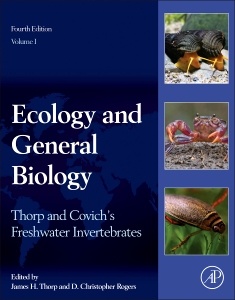Description
Thorp and Covich's Freshwater Invertebrates (4th Ed.)
Ecology and General Biology
Coordinators: Thorp James H., Rogers D. Christopher
Language: English
Subject for Thorp and Covich's Freshwater Invertebrates:
Keywords
1148 p. · 21.5x27.6 cm · Hardback
Description
/li>Contents
/li>Readership
/li>Biography
/li>Comment
/li>
Readers familiar with the first three editions of Ecology and Classification of North American Freshwater Invertebrates (edited by J.H. Thorp and A.P. Covich) will welcome the comprehensive revision and expansion of that trusted professional reference manual and educational textbook from a single North American tome into a developing multi-volume series covering inland water invertebrates of the world. The series entitled Thorp and Covich?s Freshwater Invertebrates (edited by J.H. Thorp) begins with the current Volume I: Ecology and General Biology (edited by J.H. Thorp and D.C. Rogers), which is designed as a companion volume for the remaining books in the series. Those following volumes provide taxonomic coverage for specific zoogeographic regions of the world, starting with Keys to Nearctic Fauna (Vol. II) and Keys to Palaearctic Fauna (Vol. III). Volume I maintains the ecological and general biological focus of the previous editions but now expands coverage globally in all chapters, includes more taxonomic groups (e.g., chapters on individual insect orders), and covers additional functional topics such as invasive species, economic impacts, and functional ecology. As in previous editions, the 4th edition of Ecology and Classification of North American Freshwater Invertebrates is designed for use by professionals in universities, government agencies, and private companies as well as by undergraduate and graduate students.
2. Overview of Inland Water Habitats
3. Collection and Culturing Techniques
4. Functional Relationships of Freshwater Invertebrates
5. Ecology of Invasive Alien Invertebrates
6. Economic Aspects of Freshwater Invertebrates
7. Free-Living Protozoa
8. Phylum Porifera
9. Phylum Cnidaria
10. Phylum Platyhelminthes
11. Phylum Nemertea
12. Phylum Gastrotricha
13. Phylum Rotifera
14. Phylum Nematoda
15. Phylum Nematomorpha
16. Phyla Ectoprocta and Entoprocta (Bryozoans)
17. Phylum Tardigrada
18. Introduction to Mollusca and the Class Gastropoda
19. Class Bivalvia
20. Introduction to Annelida and the Class Polychaeta
21. Class Clitellata: Oligochaeta
22. Class Clitellata: Branchiobdellida
23. Class Clitellata: Hirudinida and Acanthobdellida
24. Introduction to the Phylum Arthropoda
25. Subphylum Chelicerata, Class Arachnida
26. Subphylum Myriapoda, Class Diplopoda
27. Introduction to “Crustacea
28. Class Branchiopoda
29. Class Maxillopoda
30. Class Ostracoda
31. Class Malacostraca, Superorders Peracarida and Syncarida
32. Class Malacostraca, Order Decapoda
33. Hexapoda – Introduction to Insects and Collembola
34. Order Ephemeroptera
35. Order Odonata
36. Order Plecoptera
37. Order Hemiptera
38. Order Trichoptera
39. Order Coleoptera
40. Order Diptera
41. Minor Insect Orders
Dr. James H. Thorp is a professor and senior scientist at the University of Kansas (Lawrence, KS, United States). Prior to 2001, he was a distinguished professor and dean at Clarkson University, department chair and professor at the University of Louisville, associate professor and director of the Calder Ecology Center at Fordham University, and research ecologist at Georgia’s Savannah River Ecology Laboratory. He received his Baccalaureate from the University of Kansas and Masters and PhD degrees from North Carolina State. Prof. Thorp has been on the editorial board of three freshwater journals and is a former president of the International Society for River Science. His research interests run the gamut from organismal biology to community, ecosystem, and macrosystem ecology. While his research emphasizes aquatic invertebrates, he also studies fish ecology, especially food webs related. He has published more than 150 research articles and 10 books, including five volumes so far in the fourth edition of Thorp and Covich’s Freshwater Invertebrates.
Dr. D. Christopher Rogers is a research zoologist at the University of Kansas with the Kansas Biological Survey and is affiliated with the Biodiversity Institute. He received his Ph.D. degree from the University of New England in Armidale, NSW, Australia. Christopher specializes in freshwater crustaceans (particularly the Branchiopoda and the Decapoda) and the invertebrate fauna of seasonally astatic wetlands on a global scale. He has numerous peer reviewed publications in crustacean taxonomy and invertebrate ecology, as well as published popular and scientific field guides and identification manuals to freshwater invertebrates. Christopher is an Associate Editor for the Journal of Crustacean Biology and a founding member of the Southwest Association of Freshwater Invertebrate Taxonomists. He has been involved in aquatic invertebrate conservation efforts all over the world.
- Global coverage of aquatic invertebrate ecology
- Discussions on invertebrate ecology, phylogeny, and general biology written by international experts for each group
- Separate chapters on invasive species and economic impacts and uses of invertebrates
- Eight additional chapters on insect orders and a chapter on freshwater millipedes
- Four new chapters on collecting and culturing techniques, ecology of invasive species, economic impacts, and ecological function of invertebrates
- Overall expansion of ecology and general biology and a shift of the even more detailed taxonomic keys to other volumes in the projected 9-volume series
- Identification keys to lower taxonomic levels




